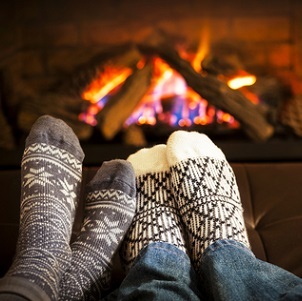
Shutterstock
As with all forms of energy use, there are pros and cons to burning wood for heat. A big "pro" is that (sustainably-sourced) wood is a renewable resource; a major "con" is that woodsmoke is quite locally polluting.
Tips for making a wood-burning fireplace or stove better for health and the environment:
*Burn clean, split wood that has been dried for at least 6 months.
*Choose hardwoods over softwoods. Hardwoods are denser and burn more slowly and evenly, producing more heat energy and less smoke.
*Don't burn treated wood, plastics, rubber, petroleum products, paints or solvents. Burning these materials can produce toxic fumes.
*Aim for small, hot fires instead of big, smouldering ones. Use small pieces of wood and don't overload the appliance.
*Check the smoke from the chimney. The darker and thicker the smoke, the more pollutants the fire is emitting, and the more fuel it's wasting. Ideally you want pale, wispy smoke.
*A clean fireplace is more efficient: remove ash and soot, and get chimneys inspected annually and cleaned if necessary. Apart from efficiency though, a clean system is safer and much less likely to cause CO leaks and chimney fires.
*Check the seal on the flue damper: it should fit well. Keep the damper closed when not in use.
*Save the ashes and mix them in your compost heap - this adds nutrients to your garden.
*Recycle old newspapers into paper "logs". Roll newspaper sheets around a broom handle until your log is the desired size, then soak it in water. Let the logs dry fully before burning them.
Fireplace, stove or electric?
A traditional decorative fireplace with open flames and chimney is the least energy efficient kind of wood-burning setup, so if you have one of these you might want to consider installing a more efficient modern enclosed model, fuelled with wood, gas or wood pellets. A solid wood-fired masonry stove can be very energy-efficient, but decent ones are expensive to install.
Electric heaters (including those rather kitsch fake fires that have thankfully gone out of fashion) are going to push up your utility bill and aren't nearly as cheery, but then they won't cause local woodsmoke pollution.
Unless you're using an electric heater with a renewable energy source like solar or hydro (and hardly anyone is doing that yet), residential heating adds to carbon emissions and air pollution - no way round it. So insulate your home, rooms and self with clothing as well as you can first before settling down to some cosy winter fuel-burning.
Read more:
Block the chill
Insulate your ceilings for all seasons
Tips for making a wood-burning fireplace or stove better for health and the environment:
*Burn clean, split wood that has been dried for at least 6 months.
*Choose hardwoods over softwoods. Hardwoods are denser and burn more slowly and evenly, producing more heat energy and less smoke.
*Don't burn treated wood, plastics, rubber, petroleum products, paints or solvents. Burning these materials can produce toxic fumes.
*Aim for small, hot fires instead of big, smouldering ones. Use small pieces of wood and don't overload the appliance.
*Check the smoke from the chimney. The darker and thicker the smoke, the more pollutants the fire is emitting, and the more fuel it's wasting. Ideally you want pale, wispy smoke.
*A clean fireplace is more efficient: remove ash and soot, and get chimneys inspected annually and cleaned if necessary. Apart from efficiency though, a clean system is safer and much less likely to cause CO leaks and chimney fires.
*Check the seal on the flue damper: it should fit well. Keep the damper closed when not in use.
*Save the ashes and mix them in your compost heap - this adds nutrients to your garden.
*Recycle old newspapers into paper "logs". Roll newspaper sheets around a broom handle until your log is the desired size, then soak it in water. Let the logs dry fully before burning them.
Fireplace, stove or electric?
A traditional decorative fireplace with open flames and chimney is the least energy efficient kind of wood-burning setup, so if you have one of these you might want to consider installing a more efficient modern enclosed model, fuelled with wood, gas or wood pellets. A solid wood-fired masonry stove can be very energy-efficient, but decent ones are expensive to install.
Electric heaters (including those rather kitsch fake fires that have thankfully gone out of fashion) are going to push up your utility bill and aren't nearly as cheery, but then they won't cause local woodsmoke pollution.
Unless you're using an electric heater with a renewable energy source like solar or hydro (and hardly anyone is doing that yet), residential heating adds to carbon emissions and air pollution - no way round it. So insulate your home, rooms and self with clothing as well as you can first before settling down to some cosy winter fuel-burning.
Read more:
Block the chill
Insulate your ceilings for all seasons




 Publications
Publications
 Partners
Partners













